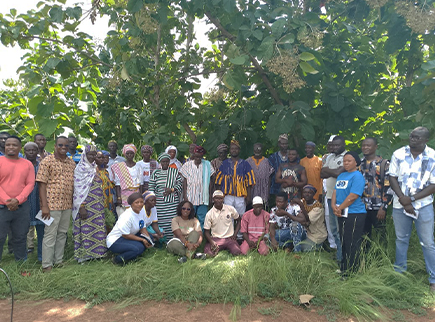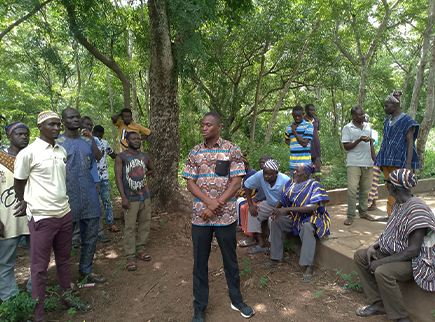The Global Landscapes Forum (GLF) through its local network chapter, GLFx Tamale, is leveraging indigenous knowledge and traditional practices to promote environmental sustainability and forest conservation at Yiworgu community in the Savelugu Municipality.
At the heart of this initiative is the ancient Maltiti Shrine, a 12-acre sacred forest that has for generations been preserved through spiritual reverence and customary taboos prohibiting tree felling, hunting, and other destructive activities within its boundaries.
The name Maltiti, meaning “Make things better for us,” reflected the community’s deep-rooted philosophy of harmony between humans and nature, a principle that continues to guide conservation efforts in the area.
Mr Abukari Wumbei Gundadow, Chief Priest of the shrine, told journalists, who visited the area, that the continued protection of the grove was anchored in the people’s spiritual reverence and strict adherence to its sacred rules.
He said “No one is allowed to cut a tree or kill an animal here. The gods protect this forest. Once, a woman violated the rules and cut down a tree, and she later lost her life. Since then, everyone has respected the laws of the shrine.”
The grove, home to indigenous tree species such as Shea, Dawadawa, and Baobab, stands as a living testament to how culture and traditions can support modern environmental protection and biodiversity conservation.
Beyond its ecological role, the Maltiti Shrine also serves as a centre for healing, fertility, and spiritual protection attracting visitors from across Ghana.
Recognising the strength of these indigenous systems, the GLFx Tamale Chapter, led by the Regional Advisory Information and Network Systems (RAINS), is working with the Yiworgu community to promote sustainable land use, biodiversity conservation, and climate resilience.

Mr Mohammed Kamel Damma, a member of GLFx Tamale, said the Yiworgu experience demonstrated how traditional knowledge could effectively complement modern sustainability practices.
He said “The Yiworgu community has shown that traditional systems can protect nature. We are building on this model to help other communities integrate local wisdom with modern approaches to afforestation and agroecology.”
He explained that in collaboration with RAINS, farmers in the Savannah Ecological Zone were being supported to adopt composting, reduce chemical fertilizer use, and practice organic pest control to restore soil fertility and promote sustainable agriculture.
He said together with the African Biodiversity Network, the partners had cultivated one acre of Tig trees, a species known for improving soil quality and providing shade, which enhanced local ecosystem restoration.
Mr. Hardi Tijani, Executive Director of RAINS said traditional practices held valuable lessons for addressing today’s environmental and climate challenges.
He said “In many of our communities, sacred sites like the Maltiti Shrine have preserved forests for centuries. If tree planting is our climate response, then protecting these sacred forests is equally crucial.”
He said RAINS and its partners were also working to revive indigenous seed varieties, enhance food security, and promote economic tree cultivation especially Shea to empower women and smallholder farmers.
Mr Tijani said the Maltiti Shrine also served as a cultural and spiritual attraction, drawing visitors, who sought guidance, fertility blessings, and protection against misfortune, a factor that reinforced community ownership and pride in the forest.
He said the shrine’s continued preservation illustrated how indigenous spirituality and cultural values could drive community-led conservation, enhance ecosystem resilience, and support national climate action goals.
The visit to Yiworgu formed part of a media tour organised by the GLF through its GLFx network and in collaboration with the African Forest Forum to showcase local initiatives that linked traditional knowledge, sustainable land use, and climate action.
While similar visits to the Eastern Region highlighted forest protection and landscape restoration, the Yiworgu engagement underscored how the GLFx Tamale Chapter was promoting community-based conservation and sustainable livelihoods.
While the Northern Region visit highlighted how the GLFx Tamale Chapter advanced community-based landscape restoration through nature-based solutions and sustainable livelihoods, the Atewa segment showcased how communities benefited from the REDD+ solution, which went beyond reducing deforestation and forest degradation to include conservation, sustainable management of forests, and the enhancement of forest carbon stocks.
The tour emphasised the importance of integrating indigenous knowledge, nature-based solutions, and modern science to advance climate resilience, biodiversity protection, and the achievement of the United Nations Sustainable Development Goals especially those on climate action, life on land, and poverty reduction.
Through this engagement, the GLF and its partners sought to amplify local conservation stories and demonstrate that the fusion of ancient wisdom and modern science offers enduring solutions for people, nature, and the planet.


https://shorturl.fm/YbBfL